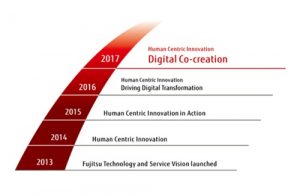3 mins read
Fujitsu Sets Out “Fujitsu Technology and Service Vision 2017”

March 31, 2025
Copyright 2023, IT Voice Media Pvt. Ltd.
All Rights Reserved

 Fujitsu today released the latest evolution of its Fujitsu Technology and Service Vision. In conjunction with the creation of the 2017 edition of its Fujitsu Technology and Service Vision, in February 2017 Fujitsu conducted a global survey relating to digital technologies, in which it surveyed 1,614 management executives and decision makers across a wide range of companies. The survey yielded many findings related to the progress of digital transformation. Leveraging these findings, this year’s Vision proposes a unique approach to co-creation utilizing digital technologies (Digital Co-creation), which Fujitsu believes will become a business norm in an emerging digital society. It also outlines practical steps technology leaders should take to maximize the value of digital technologies.
Fujitsu today released the latest evolution of its Fujitsu Technology and Service Vision. In conjunction with the creation of the 2017 edition of its Fujitsu Technology and Service Vision, in February 2017 Fujitsu conducted a global survey relating to digital technologies, in which it surveyed 1,614 management executives and decision makers across a wide range of companies. The survey yielded many findings related to the progress of digital transformation. Leveraging these findings, this year’s Vision proposes a unique approach to co-creation utilizing digital technologies (Digital Co-creation), which Fujitsu believes will become a business norm in an emerging digital society. It also outlines practical steps technology leaders should take to maximize the value of digital technologies.